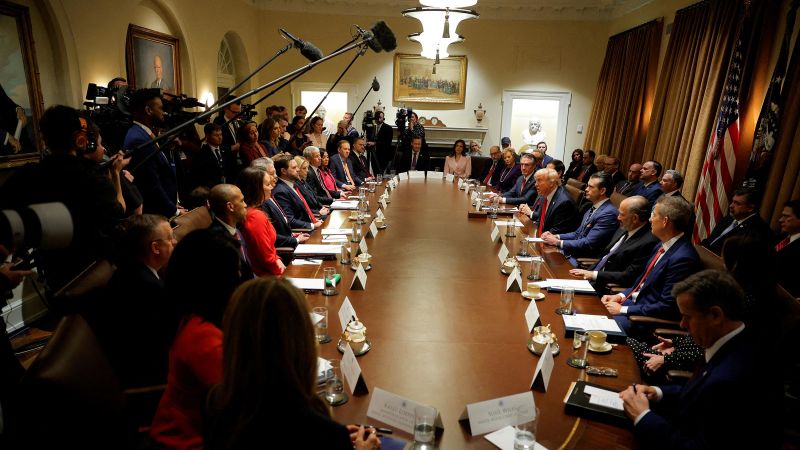The initial months of President Donald Trump’s second term have sparked significant scrutiny regarding the potential conflicts of interest within his Cabinet, widely regarded as one of the wealthiest in modern American history. Trump’s appointment of high-profile individuals from the energy and banking sectors appears to align closely with his administration’s policies, which many argue dismantle longstanding regulatory frameworks designed to combat government corruption. As Trump approaches the 100-day milestone of his presidency, actions taken by his administration have revealed a pattern of slashing federal workforce numbers, imposing tariffs that disrupt global economies, and ultimately carving out pathways that seemingly benefit Cabinet members and their previous enterprises.
The ethical landscape surrounding these appointments raises numerous red flags. A systematic review conducted by CNN indicates that under Trump’s leadership, traditional oversight bodies have been weakened, a climate which fosters conflicts of interest. The watchdog organization Campaign Legal Center identified at least eight executive branch nominees who would have faced bans or restrictions in prior administrations for their recent lobbying activities. This pattern has led some to question whether Trump’s Cabinet is more concerned with servicing their own financial interests rather than the welfare of the American populace.
Quite vividly, the contrasts between Trump’s administration and those before him become apparent when examining conspicuous displays of potential favoritism. A notable instance involved Trump’s use of the White House lawn as a backdrop for an advertisement promoting Tesla, a struggling brand owned by key adviser and major donor Elon Musk. Furthermore, the administration’s regulatory changes have seemingly paved the way for Musk’s companies, including Starlink, to secure lucrative government contracts.
Delving deeper into the ethical implications, specifics emerge from the financial disclosures of Cabinet members. For instance, Energy Secretary Chris Wright is poised to receive a substantial bonus from the fracking company he previously helmed—highlighting a glaring conflict of interest as he now occupies a role that holds regulatory power over the same company. Other Cabinet appointees have found ways to sidestep strict divesting rules by transferring control of assets to their adult children—an action that some ethics experts criticize as a weak loophole intended to retain influence while ostensibly adhering to ethical standards.
The potential for conflicts extends to beyond just individual Cabinet members. Trump’s policies have practical intersections with his own financial ventures, particularly observable in his moves to establish a national Bitcoin reserve. Such actions could bolster the values of cryptocurrencies right in line with personal investments made by Trump and his family, who are increasingly delving into crypto-related industries. The administration’s push to create favorable crypto regulations activates suspicion, particularly among critics who argue that the administration seems detached from ethical considerations, reminiscent of attitudes predating accountability reforms implemented post-Watergate.
While Trump’s administration claims that slashing regulations and reducing government inefficiency are crucial objectives, it simultaneously appears that many of these directives align conveniently with the financial interests of those at the highest levels of governance. History has shown that past administrations imposed stringent ethics regulations to curb undue influence—many of which Trump has disregarded, further exacerbating concerns of self-dealing. In a striking observation, Columbia University law professor Richard Briffault explains that the level of apparent indifference to ethical standards under Trump recalls a pre-Watergate era of governance.
The machinations behind such governmental actions extend into sector-specific initiatives as well. Specifically, decisions regarding Internet access and the favoring of satellite technology over fiber-optic services could drastically alter the landscapes serving rural communities. Trump’s approach of prioritizing companies like SpaceX could result in significant government applause at the cost of delayed infrastructure projects previously aimed at providing high-speed internet to underserved areas.
As one navigates through the entangled web of Trump’s last Cabinet appointments, conflicts of interest seem to proliferate, comprising not just personal financial stakes but deeper systemic issues of integrity and accountability. The complexities underscore concerns regarding whether governmental decisions are genuinely designed for the common good or if they are the byproducts of strategic relationships with influential financial backers and industry leaders poised to benefit from deregulation efforts.



